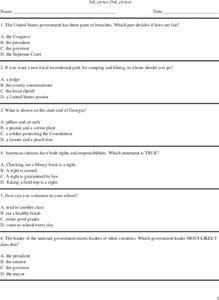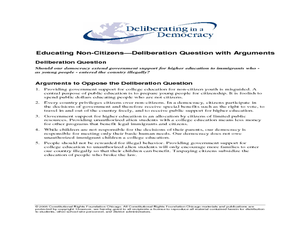Curated OER
History Biographies
Students explore the life and the contributions of five people from U.S. history in the five lessons of this unit. james Madison, Dolly Madison, Sequoyah, Harriet Tubman, and Clara Barton are presented to students for exploration and...
Curated OER
We the People Lesson 2
Students compare the Federalists and Anti-Federalists visions for the U.S. government. In this government lesson, students conduct research on Federalists and Anti-Federalists figures. Students use their findings to help them write...
Curated OER
Government Reform - Term Limits
High schoolers consider the need for term limits. In this U.S. government lesson, students read selected articles about the pros and cons of term limits. High schoolers then survey their class regarding their opinion of term limits....
Curated OER
Legislative Branch (Congress) Questions
In this U. S. government activity, students respond to 10 short answer questions about the responsibilities of congressional members.
Curated OER
Judicial Branch & Supreme Court Questions
In this U. S. government worksheet, students respond to 19 short answer questions about the responsibilities of Supreme Court members in the United States.
Curated OER
Chapter 2 – The US From 1789 to 1815
In this U.S. history worksheet, students read assigned textbook pages about the country from 1789-1815 and respond to 36 short answer questions.
Curated OER
Civics Review for Grade 3
In this civics review for grade 3 worksheet, 3rd graders answer 25 multiple choice questions about U.S. government in standardized test format.
Curated OER
Voting and the U.S. Constitution (Past, Present, and Future), Part 2
Students analyze and discuss the 19th Amendment, and read the document, Why Women Want to Vote. Students illustrate statements from the handbill, then conduct a play about women's suffrage.
Center for Civic Education
To Amend or Not to Amend, That's Been the Question...Many Times
Looking for some ideas for how to celebrate September 17, Constitution Day? Check out a packet that focuses on the factors that are considered in the amendment process. Class members examine the amendment process and the types of...
Judicial Learning Center
Civil Rights and Equal Protection
Almost every American is familiar with the Supreme Court case of Brown vs. Board of Education. Far fewer understand the constitutional reasoning or the wide-ranging consequences of the ruling in the field of criminology. The interesting...
State Bar of Texas
Roe v. Wade
At what point does the right of privacy end and the government begin? Scholars research rights under the Ninth Amendment to the Constitution. Using the 1973 Roe v. Wade Supreme Court case as a starting point, along with small group work...
Center for Civic Education
What Does Returning to Fundamental Principles Mean?
Looking for materials for your Constitution Day and Citizenship Day lessons? Then check out this packet of activities that not only gets your class members thinking critically about the fundamental principles at the heart of American...
Scholastic
The Right to Vote
Who used to have the right to vote in the United States? Who has the right to vote now? Amendments to the US Constitution that have changed the definition of eligible voters are the focus of a one-page activity that asks class members to...
National Constitution Center
Separation of Powers
Learners explore how the Constitution provides for separation of power and limited government, as evidenced by the three branches of government. They participate in role-playing situations, group discussions, and complete worksheets to...
Deliberating in a Democracy
Educating Non-Citizens
High schoolers distinguish between the privileges of being a U.S. Citizen and privileges that are forfeited if not a U.S. Citizen. For this history lesson, students analyze the rights of people in a democratic society through research,...
Administrative Office of the US Courts
Nomination Process
"I do solemnly swear that I will support and defend the Constitution of the United States..." Scholars investigate the nomination process of Supreme Court justices when assuming office. Through examination of primary and secondary...
C-SPAN
Choice Board: Expressed and Implied Powers
Article 1, Section 8 of the United States Constitution expressly lists powers given to Congress. Over the years, lawmakers have expanded the enumerated powers to include powers implied by the list. To better understand the significance...
Deliberating in a Democracy
Voting
Young scholars read about voting rights and compulsory voting in democracies. For this voting rights lesson plan, young scholars analyze the reasons for supporting and opposing compulsory voting and discuss whether compulsory voting is...
Curated OER
The Missouri Compromise of 1820
Students use a map of the Missouri Compromise to explain the geographical changes it brought to the U.S. and why the changes provoked a debate over the expansion of slavery in the U.S.
Curated OER
A Nation's Voice
Students research the Constitution and the War Powers Act in order to determine what the powers of the government are in times of conflict. They answer a series of questions then write a legal brief either supporting or condemning the...
Curated OER
Readers Theatre: Presenting Historical Events Through Theatre
Students examine historical events. In this lesson on the US Constitution, students engage in a theatrical exploration of the Constitution and the Bill of Rights. They also engage in an extensive discussion, complete worksheets and draft...
Curated OER
Cartoons for the Classroom: The Bush and Clinton Years
Examine how the Bush and Clinton years are an example of political dynasties. This cartoon provides a way to explore the concept and activate critical thinking skills in order to better grasp U.S. Politics. A fun and educational way to...
Curated OER
Plessy V. Ferguson: "Separate but Equal," Equal Protection
Students explore the details and impact of the Plessy vs. Ferguson U.S. Supreme Court case. In this U.S. History lesson, students participate in several group discussions and group activities that examine both sides of the famous...
Museum of Tolerance
The Role of Citizens in a Participatory Democracy
Groups research participatory democracies and compare the role and rights of citizens in ancient history with those in recent U.S. history. Guided by a series of questions, individuals compose a persuasive essay in which they discuss the...
Other popular searches
- Amendments u.s. Constitution
- U.s. Constitution Test
- U.s. Constitution Day
- U.s. Constitution Article 1
- The u.s. Constitution
- U.s. Constitution and Pdf
- U.s. Constitution Articles
- U.s. Constitution Word Search
- Government u.s. Constitution
- U.s. Constitution and Pd
- U S Constitution Lessons
- U.s Constitution Lessons

























